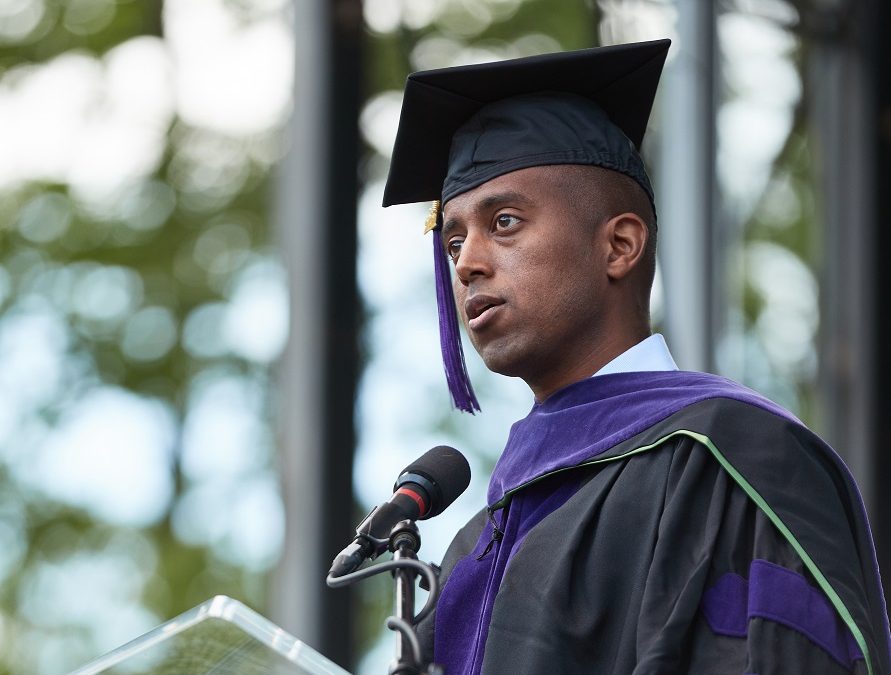This month’s professional spotlight is Andom Gherezghiher, a Major in the U.S. Marine Corps and an attorney serving as legal counsel for the Marine forces. Read on to learn more about Andom’s incredible career serving in the military and practicing law.
What is your current role and can you give us some background of your experiences?
Currently, I serve as the Regional Victims Legal Counsel for the National Capital Region. I’m responsible for providing advocacy and representation to qualified victims of sexual assault and domestic violence.
Throughout the last 10 years, I have served as the senior defense counsel for Marine Forces Europe, Marine Forces Africa and Marine Forces Reserve; an Operations Officer/Instructor at the Defense Institute for International Legal Studies (DIILS), where I was fortunate enough to travel to over 30 countries and work with our partner nations in a variety of legal topics – such as Rules of Engagement, targeting, detention operations, etc.
Other billets include time as a prosecutor, family law attorney, as well as a couple of stints doing operational law overseas.
What made you want to join the Military?
My biggest professional fear was to become stagnant. I always wanted a professional life that is challenging and dynamic. Additionally, I’m an outdoorsy type of guy with a passion for travel. The Marine Corps provided the right blend of all those features.
It’s physically and mentally exacting, but at the same time provides an opportunity for leadership, travel, and unique outlier experiences. I have practiced in multiple mainstream areas of law all over the globe.
Everyday I wake up excited to make myself a better lawyer, better person and a better leader.
…Cool uniforms and built-in excuse to work out doesn’t hurt either.
What are the most rewarding and challenging aspects of your career?
I think the most rewarding part is being able to hang my hat at the end of the day saying “I served a greater good ”.
Whether it’s expanding the rule of law, protecting human rights or defending a client in a Court’s Martial, not once have I ever come home and felt like “a dirty lawyer”.
The most challenging aspect is more on a personal aspect than the professional side. Military members normally have to move every 3 to 4 years; which can get a little rough on the family.
What would you tell somebody who wants to join the military?
I would tell them that if they want to challenge themselves physically and mentally; if they want to be part of something that is bigger than them: if they want to have a concrete impact on society, then do it. You have to be humble in order to serve… So there will be some pain along the way, but the benefits, both financial and spiritual, make it worthwhile.
If I knew at 18 years of age what I know now, there is no way I wouldn’t do at least one tour in order to get the experience, training and money for college.
And if you like to travel, the sea services are for you – I’ve been to countries I never even knew existed and have been to some of the most exotic places on earth. I know the streets of Amman are almost as good as the roads of Tashkent… And that’s all thanks to the Marine Corps.
What is your Greatest professional accomplishment?
In 2014/2015 I was the Commander for a unit of over 400 Marines and Sailors. Being able to lead, mentor and guide those service members was one of the most rewarding and educational things I ever got to do. They made me a better human being by sharing their struggle and successes with them.
Is there a philosophy that drives your career?
“Be bold, be brief, be gone”. I firmly believe that if you’re going to do something, go all out. It’s when one fully devotes him/herself to the task that we can truly realize fulfillment.
And in that same breath, avoiding stagnation is key to maintaining happiness. One of the reasons I love being in the services is that no two days are the same. I have not had the same billet (job) for more than 2 years. Things are always changing and responsibilities always evolving. I’ve had multiple opportunities to go to civilian and military professional schools that has enabled me to continue to push forward.
What’s one piece of advice you would give someone looking to transition into your line of work?
Do your research to find the right service and the right career path within that service. But once you have done that, commit. Fully devote yourself to it and you will succeed. The profession of arms is not one that can be done with a half step.
What skills have you found to be vital for your job?
Empathy and communication. The service truly brings people from all walks of life; the different socioeconomic, cultural, religious and racial lines come together for a unified effort. I think one of the things that has served me well is the ability to remove my personal biases when dealing with group settings and try to harmonize points of view for a common goal.
Clear, concise and direct communication also cuts out a lot of the friction that can occur in large organizations. Effectively conveying one’s thoughts and positions to both superiors and subordinates is the skill that took me time to develop but has been invaluable in my career.
Outside of all of your hard work and professional efforts, what do you do for fun?
Biggest one is travel. My son is not even five yet and he’s been to almost a dozen countries. My wife and I take advantage of all the opportunities and benefits of being in the military and are constantly globetrotting.


Andom, I have witnessed your personal and professional growth and I am in owe of your humility and ability to make others around you feel important and respected. Your combined intellect and ability to stay focused will continue to serve you well as you climb higher in your profession. You are setting a positive example for others to follow. We are proud of you and thank you for your service.
Andom as always you are great in everything you do. I watched you growing to be discipline,strong and intellectual. Very good debater at times Very Argumentative
Good luck with your beautiful family
Uncle Y.K.
Amazing young man!! It takes razor sharp focus and determination to be you! I am proud of you!!
Your Uncle!!